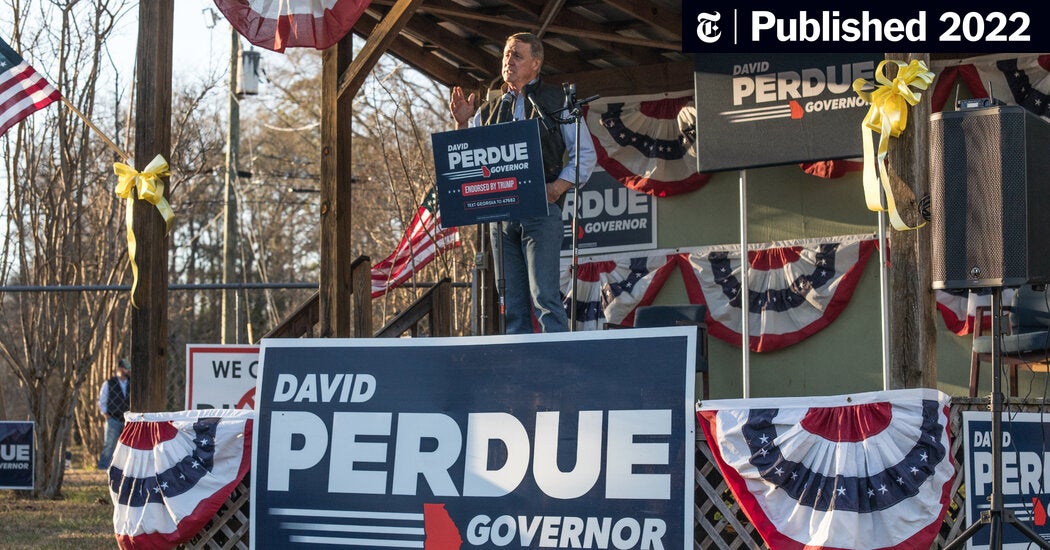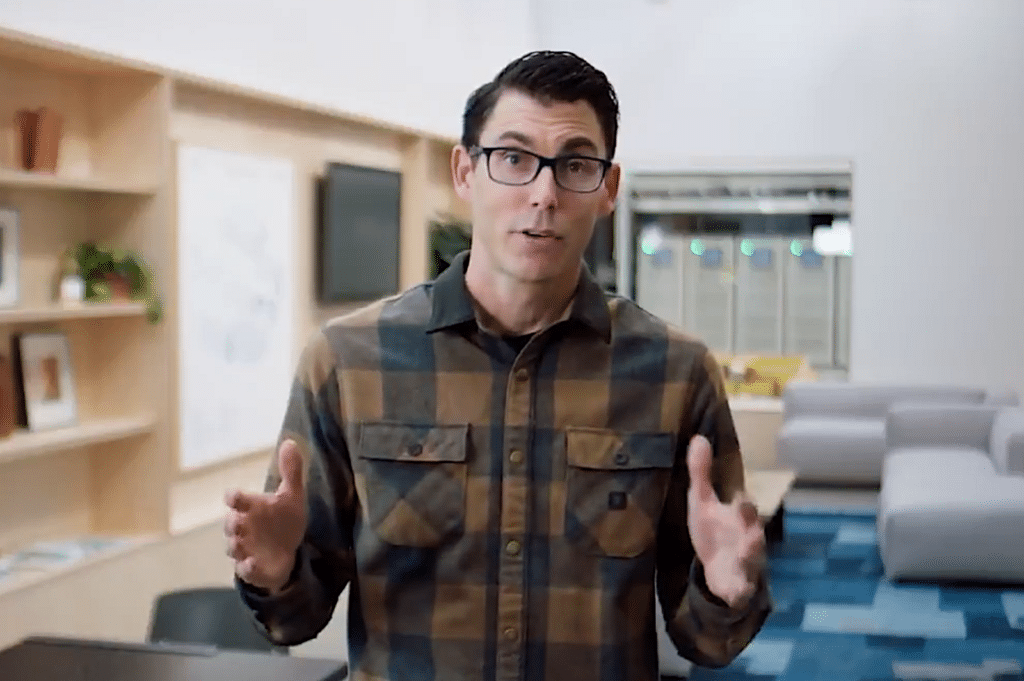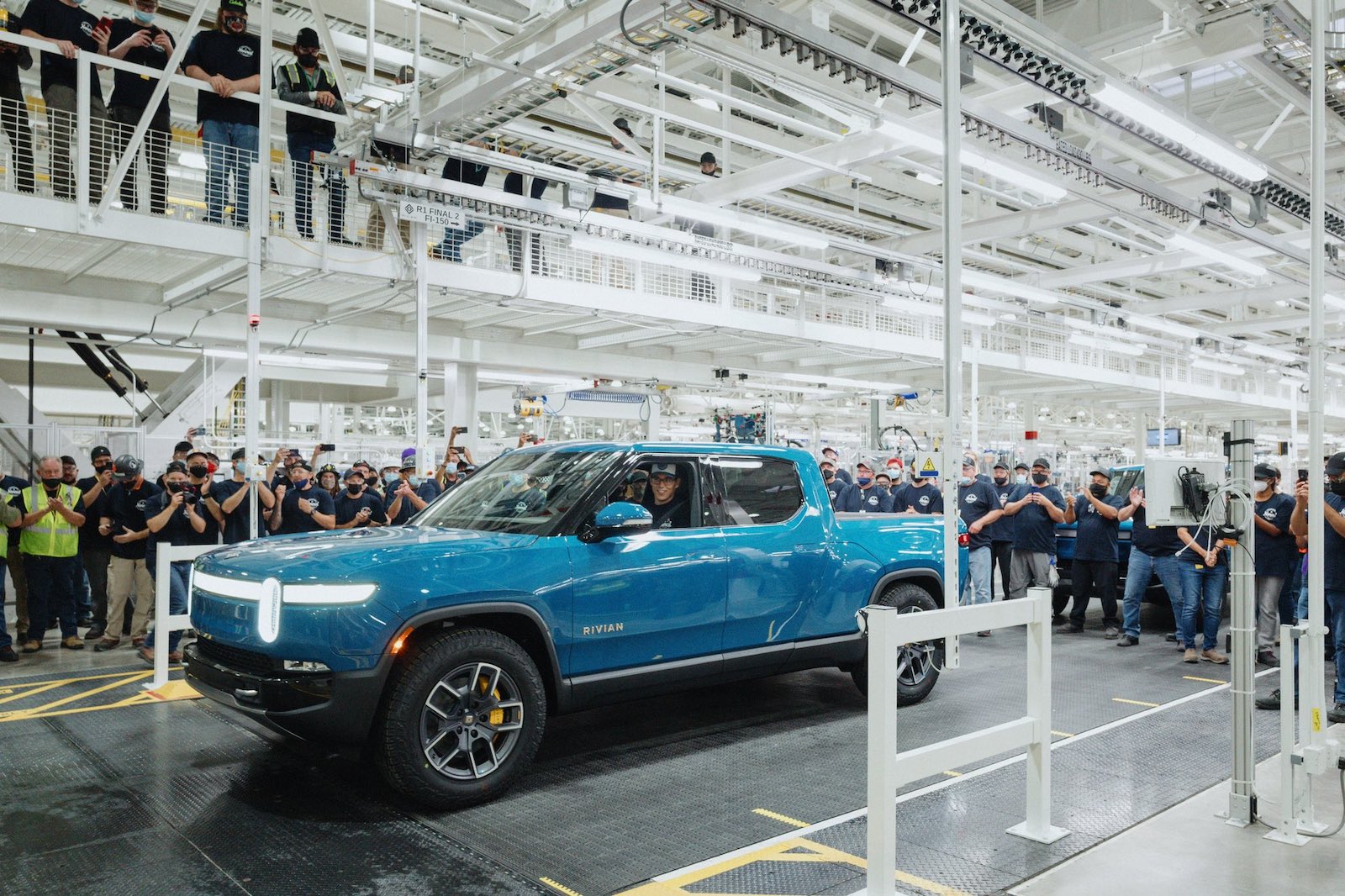It is billed as the largest economic development project in the history of Georgia, an electric vehicle factory that could grow to be five times as large as the Pentagon and produce as many as 400,000 emissions-free trucks a year.
The factory, to be built by the upstart electric automaker Rivian, is being heralded by many as a transformational $5 billion investment that will invigorate the local economy with 7,500 new green jobs and help accelerate the transition away from fossil fuels and toward clean energy.
It has also created an unlikely pairing, uniting Rivian, a California company committed to combating climate change, and Gov. Brian Kemp, a Republican, in a bid to bring electric vehicle production into an area where gas-guzzling pickups rule the road.
But in recent months, the project has gotten tangled in the kind of partisan politics that is pulsing through many aspects of American life. Opponents have been holding rallies, organizing online, dabbling in conspiracy theories and even threatening local officials.
Advertisement
Continue reading the main story
And beyond the political disputes, the debate over the factory is emblematic of broader tensions bedeviling the environmental movement, with the need to build new emissions-free infrastructure colliding with the age-old impulse to preserve unspoiled lands.
“This is a story that’s playing out with solar facilities, wind farms and transmission lines for renewable energy all across the country,” said Michael Burger, executive director of the Sabin Center for Climate Change Law at Columbia University. “It’s always going to be a case-by-case question of whether the trade-off is viable, and sometimes NIMBYism is going to win out.”
Opponents cite a range of concerns. Some fear the factory will contaminate the groundwater. Others disapprove of the lucrative public incentives being offered to Rivian. Many worry the huge facility will change the area’s bucolic character, increasing light pollution, snarling traffic and spurring more development.
And now, the movement to stop the Rivian plant has spilled into the Georgia governor’s race.
Opponents have turned their ire on Governor Kemp, who is up for re-election this year, and found a sympathetic ally in former Senator David Perdue, who is challenging Governor Kemp in the Republican primary.
Advertisement
Continue reading the main story
Speaking to a couple hundred local residents in a leafy park, Mr. Perdue invoked George Soros, the prominent Democratic donor whose hedge fund owns $2 billion in Rivian stock and who is a frequent target of conservatives.
Representatives for Governor Kemp and Rivian said they were sensitive to the community’s concerns and that the selection of the site and the creation of the incentive package had all been done properly.
“People get concerned any time their community is impacted,” said Bert Brantley, deputy chief of staff to Governor Kemp and one of the officials who helped lure Rivian to the state. “We’re not dismissing it or taking it lightly. This is a real impact that people are going to feel. They certainly deserve to have their questions answered.”
James Chen, vice president of public policy for Rivian, said that concerns about the factory’s impact on the environment were misplaced and that the community should be celebrating the arrival of new clean economy jobs.
“This is about an American company leading in technology and innovation,” he said. “At the end of the day, we’re a green company and we want to do this in a green way.”
Advertisement
Continue reading the main story
Yet those assurances are so far doing little to calm some residents.
JoEllen Artz, a 74-year-old retiree who lives near the site and is one of the organizers of an effort to block the factory, said she believed it would wreck the local ecosystem and contaminate the aquifer in a community where most houses use well water.
“This company that makes green products is going to destroy what Mother Nature spent million of years putting together,” said Ms. Artz, a Republican who is supporting Mr. Perdue’s campaign for governor.
The roughly 2,000-acre site where Rivian plans to build its factory is largely undeveloped. There is a 200-year-old house on the property, which the company may help relocate, and residents hunt in the woods.
Some Democrats oppose the factory, too. Jeanne Dufort, a local real estate broker, attended the rally for Mr. Perdue wearing a T-shirt declaring her support for Stacey Abrams, the Democrat who is running for governor.
“We’re not red or blue,” said Ms. Dufort, who has lived in the area for 21 years and said she was concerned that the factory would irrevocably transform the area’s small-town feel. “We have carefully defined what we want this community to be, and this is not it.”
Other residents are concerned that Rivian, which went public in November with a valuation of nearly $70 billion but has seen its stock tumble since then, may fail and leave the community with a vacant industrial site. Last week, Rivian reported revenue of $55 million and a net loss of $4.7 billion for the previous year, sending the company’s stock down sharply.
Advertisement
Continue reading the main story
Another source of contention is the incentive package the state is offering Rivian. Governor Kemp has allocated $125 million in his proposed budget for land and training costs associated with the factory, and the state and local municipalities are expected to give Rivian hundreds of millions of dollars in tax breaks in the years ahead.
“If they’re going to give $125 million to a California corporation, I should get that same option as a small-business owner,” said Chas Moore, a partner in an auto repair shop. “The government should not be picking winners and losers in private industry.”
Others expressed more general skepticism about the viability of electric vehicles.
Ray Austin, who owns a landscaping business and attended the rally for Mr. Perdue, said that even the most powerful battery-powered trucks could not haul all the gear he needs during long days on the road. “I’ll never go electric on a vehicle because I can’t,” he said.
And Dena Astin, a kindergarten teacher, said she was concerned about the potential pollutants in the lithium batteries used to power electric vehicles. “There are problems with electric cars, just like there are problems with gasoline fueled cars,” she said.
But in Rutledge, antipathy for the Rivian factory has gone beyond simple not-in-my-backyard localism, at times veering into the conspiratorial.
Bruce LeVell, a Georgia businessman and an adviser to former President Donald J. Trump, who introduced Mr. Perdue at the rally, cast the project as an effort by Democrats to sway the vote in an overwhelmingly Republican county.
“We found out that Soros has a tremendous amount of money backing this project,” Mr. LeVell said in an interview with One America News, the far-right television network. “We don’t need George Soros involved in anything dealing with Georgia.”
Advertisement
Continue reading the main story

 www.nytimes.com
www.nytimes.com
The factory, to be built by the upstart electric automaker Rivian, is being heralded by many as a transformational $5 billion investment that will invigorate the local economy with 7,500 new green jobs and help accelerate the transition away from fossil fuels and toward clean energy.
It has also created an unlikely pairing, uniting Rivian, a California company committed to combating climate change, and Gov. Brian Kemp, a Republican, in a bid to bring electric vehicle production into an area where gas-guzzling pickups rule the road.
But in recent months, the project has gotten tangled in the kind of partisan politics that is pulsing through many aspects of American life. Opponents have been holding rallies, organizing online, dabbling in conspiracy theories and even threatening local officials.
Advertisement
Continue reading the main story
And beyond the political disputes, the debate over the factory is emblematic of broader tensions bedeviling the environmental movement, with the need to build new emissions-free infrastructure colliding with the age-old impulse to preserve unspoiled lands.
“This is a story that’s playing out with solar facilities, wind farms and transmission lines for renewable energy all across the country,” said Michael Burger, executive director of the Sabin Center for Climate Change Law at Columbia University. “It’s always going to be a case-by-case question of whether the trade-off is viable, and sometimes NIMBYism is going to win out.”
Opponents cite a range of concerns. Some fear the factory will contaminate the groundwater. Others disapprove of the lucrative public incentives being offered to Rivian. Many worry the huge facility will change the area’s bucolic character, increasing light pollution, snarling traffic and spurring more development.
And now, the movement to stop the Rivian plant has spilled into the Georgia governor’s race.
Opponents have turned their ire on Governor Kemp, who is up for re-election this year, and found a sympathetic ally in former Senator David Perdue, who is challenging Governor Kemp in the Republican primary.
On March 1, Mr. Perdue held a rally in Rutledge, about 50 miles east of Atlanta near the site of the planned factory. He was introduced by leaders of the opposition group and focused his remarks on why the Rivian factory was a bad fit for the community, and how, he said, Governor Kemp had sold out to special interests.
Advertisement
Continue reading the main story
Speaking to a couple hundred local residents in a leafy park, Mr. Perdue invoked George Soros, the prominent Democratic donor whose hedge fund owns $2 billion in Rivian stock and who is a frequent target of conservatives.
“We can grow the economy without selling out and giving our tax dollars to people like George Soros,” Mr. Perdue said to cheers. “We can invest in rural Georgia without kicking our communities to the curb.”Representatives for Governor Kemp and Rivian said they were sensitive to the community’s concerns and that the selection of the site and the creation of the incentive package had all been done properly.
“People get concerned any time their community is impacted,” said Bert Brantley, deputy chief of staff to Governor Kemp and one of the officials who helped lure Rivian to the state. “We’re not dismissing it or taking it lightly. This is a real impact that people are going to feel. They certainly deserve to have their questions answered.”
James Chen, vice president of public policy for Rivian, said that concerns about the factory’s impact on the environment were misplaced and that the community should be celebrating the arrival of new clean economy jobs.
“This is about an American company leading in technology and innovation,” he said. “At the end of the day, we’re a green company and we want to do this in a green way.”
Advertisement
Continue reading the main story
Yet those assurances are so far doing little to calm some residents.
JoEllen Artz, a 74-year-old retiree who lives near the site and is one of the organizers of an effort to block the factory, said she believed it would wreck the local ecosystem and contaminate the aquifer in a community where most houses use well water.
“This company that makes green products is going to destroy what Mother Nature spent million of years putting together,” said Ms. Artz, a Republican who is supporting Mr. Perdue’s campaign for governor.
The roughly 2,000-acre site where Rivian plans to build its factory is largely undeveloped. There is a 200-year-old house on the property, which the company may help relocate, and residents hunt in the woods.
Some Democrats oppose the factory, too. Jeanne Dufort, a local real estate broker, attended the rally for Mr. Perdue wearing a T-shirt declaring her support for Stacey Abrams, the Democrat who is running for governor.
“We’re not red or blue,” said Ms. Dufort, who has lived in the area for 21 years and said she was concerned that the factory would irrevocably transform the area’s small-town feel. “We have carefully defined what we want this community to be, and this is not it.”
Other residents are concerned that Rivian, which went public in November with a valuation of nearly $70 billion but has seen its stock tumble since then, may fail and leave the community with a vacant industrial site. Last week, Rivian reported revenue of $55 million and a net loss of $4.7 billion for the previous year, sending the company’s stock down sharply.
Advertisement
Continue reading the main story
Another source of contention is the incentive package the state is offering Rivian. Governor Kemp has allocated $125 million in his proposed budget for land and training costs associated with the factory, and the state and local municipalities are expected to give Rivian hundreds of millions of dollars in tax breaks in the years ahead.
“If they’re going to give $125 million to a California corporation, I should get that same option as a small-business owner,” said Chas Moore, a partner in an auto repair shop. “The government should not be picking winners and losers in private industry.”
Others expressed more general skepticism about the viability of electric vehicles.
Ray Austin, who owns a landscaping business and attended the rally for Mr. Perdue, said that even the most powerful battery-powered trucks could not haul all the gear he needs during long days on the road. “I’ll never go electric on a vehicle because I can’t,” he said.
And Dena Astin, a kindergarten teacher, said she was concerned about the potential pollutants in the lithium batteries used to power electric vehicles. “There are problems with electric cars, just like there are problems with gasoline fueled cars,” she said.
But in Rutledge, antipathy for the Rivian factory has gone beyond simple not-in-my-backyard localism, at times veering into the conspiratorial.
Bruce LeVell, a Georgia businessman and an adviser to former President Donald J. Trump, who introduced Mr. Perdue at the rally, cast the project as an effort by Democrats to sway the vote in an overwhelmingly Republican county.
“We found out that Soros has a tremendous amount of money backing this project,” Mr. LeVell said in an interview with One America News, the far-right television network. “We don’t need George Soros involved in anything dealing with Georgia.”
Advertisement
Continue reading the main story

How an Electric Truck Factory Became a Lightning Rod in Georgia (Published 2022)
The governor hailed the factory as an economic boon that would put Georgia at the vanguard of the green economy. Not everyone liked the idea.



